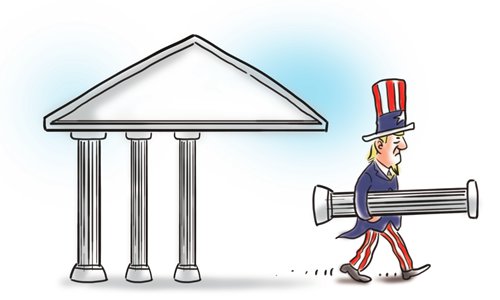
(Photo: Global Times)
President Donald Trump pulled the US out of the Iran nuclear deal earlier this month, moving to re-impose sanctions on Iran. Trump's exit marks the start of the US subjecting Iran to extreme pressure. The US may use Syria to wear out Iran militarily. Tehran has become the most important external supporter of Bashar al-Assad's government since civil war broke out in the country. However, as Saudi Arabia, Israel and the US ratcheted up military tensions, the civil war has become a battle of attrition. The longer the unrest lasts, the more resources Iran will put into it.
In the Middle East, the US, Israel and Saudi Arabia will collaborate to oppose Iran. The Trump administration's strong stance toward Iran has intensified because of Saudi Crown Prince Mohammed bin Salman's wariness over the Iran nuclear issue and Israel's threat of taking unilateral action against Tehran. The three countries have reached a consensus on together opposing Iran.
Upping the pressure on Iran, Trump signed an executive order imposing sanctions on any foreign company continuing to do business with Iran. Boeing's deal with Iran signed during the Obama administration might be scrapped. Besides, the US is likely to further impose curbs on foreign companies extracting oil in Iran. French energy giant Total will bear the brunt. President Trump intends to further isolate Iran economically.
The US also uses the North Korean nuclear issue to press Iran. The date of Trump's announcement to withdraw from the Iran deal was moved from May 12 to May 8, which might show US' intention of dominating negotiations on North Korea. The future of the North Korean nuclear crisis will exert pressure on Iran, forcing Iran to make concessions.
Iran will be bruised if the nuclear deal is abandoned. Its currency has plummeted. Almost each time President Trump examined the Iran nuclear deal, the Iranian rial plunged. Shortly after Trump's announcement, the Iranian currency dived to a record low of about 65,000 rials to 1 US dollar.
Moreover, a general feeling of insecurity has intensified in Iran. The country's domestic security controls were strict, but street demonstrations broke out since the end of 2017. Iranians aired their grievances against falling living standards and foreign affairs, and appealed to the government to focus on people's living conditions instead of supporting Syria and Lebanon's Hezbollah. President Trump also expressed his support for the demonstrations. He intends to encourage Iranians to oppose the government by slapping sanctions and making it harder for people to eke out a decent living.
Iran may regain its strong diplomatic stance. Iran's Hassan Rouhani won the presidential election and re-election because of the emergence of a relatively stable economy and improved relations with the West, especially with the US. However, President Trump frustrated the mild-mannered politician's diplomatic policies. While the US keeps pressing Iran, there will be more hawks in the government likely to affect Iran's diplomacy. Conservatives like Ebrahim Raisi and Mahmoud Ahmadinejad may have more influence in politics.
While Iran's geopolitics and economy keep worsening, it has to cope passively. First, Iran is likely to control its domestic security more strictly. For example, it has banned the popular messaging app Telegram. Second, Iran will persist in stabilizing its currency and crack down on speculation and arbitrage. Besides, Iran will develop its nuclear diplomacy and strive for the support of the UK, France, Germany, China and Russia.
The coming few weeks may be important to observe Iran's diplomacy. President Rouhani and Foreign Minister Mohammad Javad Zarif both said that whether Iran will restart enriching uranium depends on the other five parties' talks. Since the five countries promised to keep the deal, Iran will ask for specific measures, for example, comprehensively removing economic sanctions and increasing investment in the country. The other five parties shouldn't submit to US pressure. Iran's negotiations with the five countries will in turn trigger another round of games with the US. We will have to wait and see.


